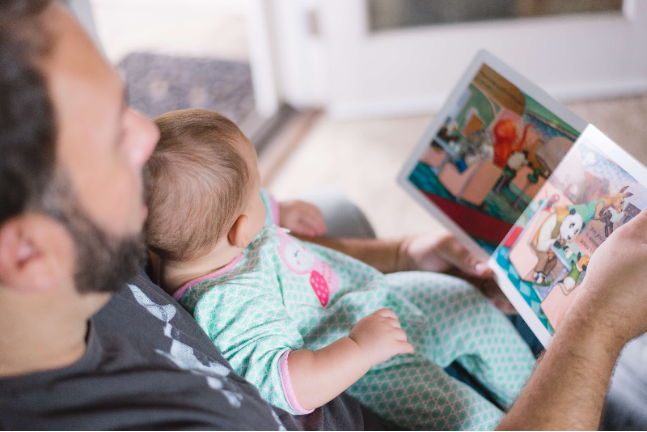


 2:13:34
2:13:34  2025-01-21
2025-01-21  909
909

(I spend ten minutes of guided play with my daughter every day, and when my husband is home he does too, so some days she gets twenty minutes of undivided attention. That’s been key for us. Right after playtime, my daughter is more cooperative, more willing to listen, and less upset. The more I connect with her on her terms, the happier, more cooperative, more confident, more respectful, and more loving I see my daughter. She even shares her toys with her brother after we play with her. It’s like a light switch for us. The key is to keep playtime and work on regulating ourselves emotionally when things get tough. Connect, connect, connect. It’s worth it!)
- Teresa, mom of a 3-year-old and a toddler
The assumption is that you need to dedicate a lot of time to building a good relationship with your child. Quality time is a myth. There’s no switch to turn on closeness. Imagine you work all day, and then you set aside an evening to spend with your husband, whom you’ve barely seen in the past six months. Will he immediately start opening up? Probably not. In relationships, quality alone is not the same as quantity. You can’t expect a good relationship with your daughter if you spend all your time at work and she spends all her time with friends, screens, or a babysitter. So as hard as it is with the pressures of work and daily life, if we want a better relationship with our kids, we have to make time—every day—for closeness. We build our children’s trust by our daily behavior—by following through on a promise to play with them, by picking them up on time, by being understanding when they’re not feeling their best. You don’t have to do anything special to build a relationship with your child. The good news—and the bad news—is that every interaction you have is a bond-building one. Grocery shopping, car trips, and bath time are all just as important as the big birthday party you’re planning. Doesn’t he want to share his toy, go to bed, or do his homework? The way you handle each challenge as he grows up is a building block of your relationship and his psyche. Because so much of our time with our children revolves around managing daily tasks, it’s important to make sure your routine is filled with fun, laughter, and warmth, rather than simply pushing your child to meet a schedule. Play is one of the most reliable ways to relieve stress and build trust with your child. Unfortunately, life, with its endless distractions and constant disconnections, has a way of undermining connection. Work, school, technology, exhaustion, and the responsibility of keeping our children busy with busy schedules all conspire to prevent us from connecting deeply. While time spent in daycare is a disconnect, so is bedtime. In fact, any time your attention is focused on something else is a disconnect for a young child. Perhaps that explains why they misbehave as soon as we talk on the phone or start cooking dinner. Even when you’re taking your child out for errands, she may see your focus on the shopping list and the store clerks as a disconnect, and she’ll react with a demand for your attention.
That’s why all parents need to reconnect with their children often, if only to repair the daily undermining of life’s natural separations and distractions. Effective parenting is nearly impossible unless you’ve reestablished a positive connection with your child, so think of it as preventative maintenance, before a problem occurs. Parents, by nature, give their children an anchor or compass to which they can turn and face. When they’re away from us, they need an alternative, so they turn to teachers, coaches, electronics, or peers. When you reengage your child physically, reengage them emotionally, too.
Be prepared to confront your child's dependency needs when you meet him again, in the form that Anthony Wolfe, author of Get Out of My Life, But Will You Drive Cheryl and Me to the Mall or Not?, calls the "infant self." What is the infant self? Your child plays happily in daycare, but as soon as you show up, he has a meltdown. That's because he's been suppressing his dependency needs so he can deal independently with a demanding environment. Your safe presence signals to him that he can relax now and let his guard down, so his adult self (what we call his “executive self”) takes a much-needed break, and his infant self takes over, with its whining, helplessness, and emotions. This is not the time for guidance; he can’t act his age now. Hug him, give him the cuddles he needs, and get him out of there. Some babies need a few minutes of crying in your arms before they’re ready to get into a car seat, and preschoolers may revert to baby talk. Accept all of this as proof of the comfort your child finds in your company, the comfort appropriate for his age. Some parents object to this as “encouraging dependency.” I see it as allowing the dependency that is already there, which if we don’t allow it to manifest in other forms. Don’t worry, your child won’t stay dependent forever. In fact, children whose dependency needs are met make a healthy transition to independence. Children whose dependency needs are crushed turn to a group of peers to satisfy them or indulge in minor forms of addiction such as electronics to tame those needs.
Reality Of Islam |
|

Researchers

A new chip-

A large inf

Choosing th
 9:3:43
9:3:43
 2018-11-05
2018-11-05
10 benefits of Marriage in Islam
 7:5:22
7:5:22
 2019-04-08
2019-04-08
benefits of reciting surat yunus, hud &
 9:45:7
9:45:7
 2018-12-24
2018-12-24
advantages & disadvantages of divorce
 11:35:12
11:35:12
 2018-06-10
2018-06-10
 6:0:51
6:0:51
 2018-10-16
2018-10-16
 7:6:7
7:6:7
 2022-03-21
2022-03-21
 9:39:36
9:39:36
 2022-12-28
2022-12-28
 2:34:48
2:34:48
 2022-01-18
2022-01-18
 4:2:19
4:2:19
 2022-10-10
2022-10-10
 3:43:50
3:43:50
 2022-11-05
2022-11-05
 1:16:44
1:16:44
 2018-05-14
2018-05-14
 10:43:56
10:43:56
 2022-06-22
2022-06-22
 5:41:46
5:41:46
 2023-03-18
2023-03-18
| LATEST |